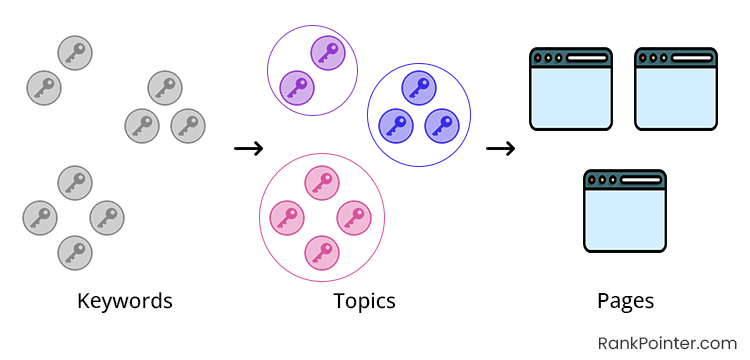Keyword mapping in SEO is a strategic approach involves the careful allocation of target keywords to respective pages on a website, documented in what is commonly known as a keyword map. The essence of keyword mapping lies in its ability to align search queries with the most relevant content, thereby enhancing a website’s visibility.
Related Article: Keyword Optimization in SEO: How to Optimize for Better Ranking?
What is Keyword Mapping?
Keyword mapping is a search engine optimization strategy that involves tactically assigning target keywords to pages on your site. And documenting your decisions in a keyword map.
The goal is to match each keyword with the page that best satisfies search intent—i.e., what the searcher is looking for. Because this is the page that stands the best chance of ranking highly in search engine results pages.

Why Is Keyword Mapping Important in SEO?
Keyword mapping is crucial in SEO because it optimizes site structure and content alignment with user intent. Google, the predominant search engine, evaluates pages based on keywords to determine relevance.
Lack of keyword presence can hinder ranking potential, while multiple pages targeting the same keyword may lead to keyword cannibalization, diluting a site’s SEO strength.
By mapping keywords to relevant pages, one can prevent cannibalization, optimize content, and identify content gaps, thus enhancing visibility in SERPs.
How to Do Keyword Mapping?
Keyword mapping involves several steps:
1. Identify Your Keywords
Start by identifying the main keyword for each page, using it as a seed to uncover related keywords through research tools. Prioritize keywords based on your overall SEO strategy and competition analysis.
Useful Article: How to Find High-Potential Keywords for SEO?
2. Group Your Keywords
Organize keywords into thematic groups based on search intent. Select a primary keyword for each group, with others serving as secondary or tertiary keywords. Consider variants to cover a broader spectrum of user queries.
3. Map Your Keywords
Create a structured keyword map, outlining your site hierarchy and individual pages. Utilize spreadsheets or specialized tools to list keywords alongside page elements like titles, meta descriptions, and headers. Ensure each page targets unique keywords.
4. Optimize Your On-Page Content
Address any issues encountered during mapping, such as missing or irrelevant content, technical issues, or internal linking opportunities. Ensure each page is optimized for its designated keywords.
Learn More: Content Optimization Strategy: A Comprehensive Guide
5. Keep Working on Your Keyword Map
Keyword mapping is an ongoing process. Regularly review and update your map to accommodate changes in technology, industry trends, or user behavior. Continuously refine your keyword strategy to stay competitive.
Keyword Mapping Tools
Several tools facilitate keyword mapping and SEO optimization:
1. Ahrefs
A comprehensive SEO tool suitable for users of all levels, Ahrefs provides easy-to-understand dashboards for swift keyword and competitor research. Its free option, Ahrefs Webmaster Tools, caters to website owners seeking efficient solutions.
2. Moz
Moz offers a family of SEO products catering to various user needs. It’s suitable for beginners and scalable for large organizations, aiding in comprehensive keyword research and mapping endeavors.
3. SEMRush
A robust SEO keyword research tool, SEMRush is a multi-dashboard powerhouse facilitating keyword mapping and overall website optimization. Its versatile features make it valuable for users across different skill levels.
4. SE Ranking
An all-in-one tool for SEO and social media management, SE Ranking offers competitive research, site audits, and marketing goal tracking. It’s particularly beneficial for B2B marketers and website owners aiming for enhanced search engine visibility.
5. AudienceKey
AudienceKey is cloud-based keyword mapping software offering iterative mapping capabilities. It assists users in generating content briefs and organizing keyword lists, making it an invaluable asset for refining SEO content marketing strategies.
Conclusion of Keyword Mapping in SEO
Keyword mapping serves as the foundation of effective SEO strategy, aligning website content with user intent to enhance visibility and ranking in search engine results. By systematically mapping keywords to relevant pages and leveraging specialized tools, website owners can improve the website visibility.


